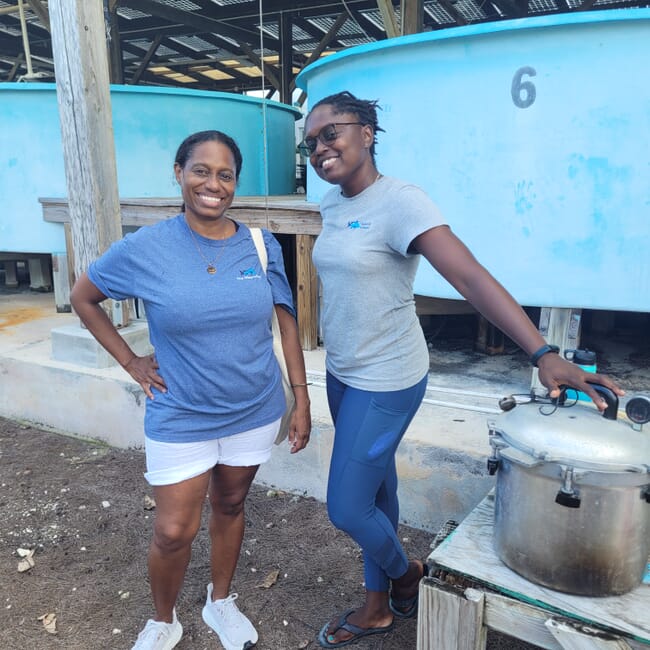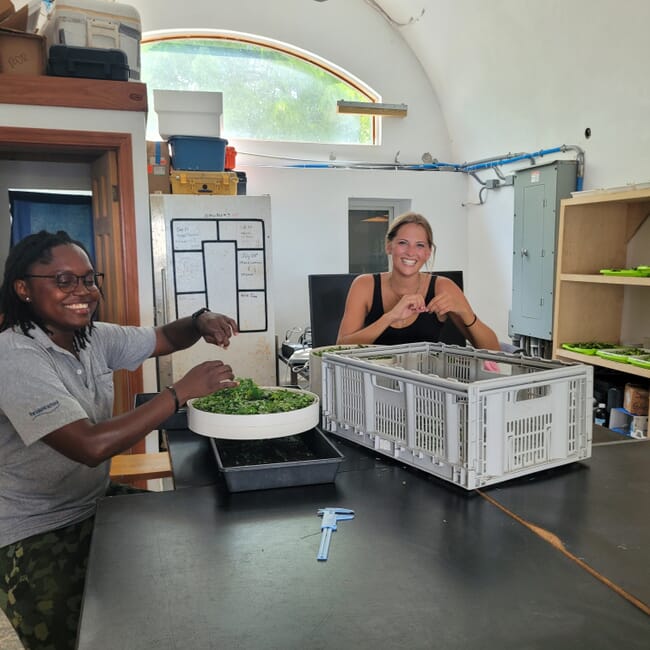
The farm produces tilapia and greens which are both served in the school canteen when available
Dr Russo, who hails from Jamaica and also heads the Women in Caribbean Aquaculture initiative and the Caribbean Aquaculture Network, is currently taking part in a project at Cape Eleuthera Island School in the Bahamas which is investigating the use of local ingredients in small scale fish farms, starting with the school’s own aquaponic farm, which contains tilapia.
Russo, who hails from Jamaica and also heads the Women in Caribbean Aquaculture initiative and the Caribbean Aquaculture Network, is currently taking part in a project at Cape Eleuthera Island School in the Bahamas which is investigating the use of local ingredients in small scale fish farms, starting with the school’s own aquaponic farm, which contains tilapia.
As well as a commitment to encouraging greater aquaculture production in the Caribbean region, Dr Russo brings a wealth of aquafeed formulation to the project, having completed a PhD in the subject at the University of Florida, before working for Hartz Mountain Corporation, in New Jersey, formulating feeds for various aquarium species, and then investigating feeds for the California white sea bass at The Hubbs-SeaWorld Research Institute in San Diego, and totoaba feeds at Universidad Autónoma de Baja California in Mexico.
During the project she has been working alongside Mia Avril, who featured in one of Russo’s recent articles for The Fish Site, and Megan Poulton from the Island School. The trio have been looking at the inclusion of local ingredients into feeds.
The sort of ingredients that they have been investigating include cassava flour – which can provide the carbohydrate requirements and act as binders for the pellets; and moringa leaves, black soldier fly larvae, fishmeal and lobster meal made from fisheries byproducts, which are all valuable sources of protein.
While they have managed to successfully formulate 40 percent protein feeds using these ingredients, their recipes now need to be validated via nutritional analysis, and Dr Russo hopes that this will be the project’s next step.
If successful, she believes that it could prove invaluable for the region’s small farmers in particular.
“Bigger farmers can afford to import feed, but smaller farmers can’t. And they also need to make small batches that can be used before they go bad in the heat, so small-scale feed production using local ingredients makes sense for many of the region’s farmers,” Dr Russo reflects.

Dr Royes Russo helped to teach them how to formulate aquafeeds © Juli-Anne Royes Russo
Spreading the word
The project has also allowed her to work closely with the students at Cape Eleuthera Island School, presenting her with an opportunity to spread knowledge of a sector that is still little-known in the region.
“We need more capacity building for education and communication. Hardly anyone in the Caribbean knows what the scope of aquaculture is, so we feel it’s really important to discuss why we need to have mariculture, not just tilapia farming, for the blue economy,” she reflects.
And her influence has not been limited to students.
“At the recent meeting of the Caribbean Region Fisheries Mechanism I shared a platform with the executive director of the Caribbean Regional Fisheries Mechanism Secretariat and the CEO of Jamaica’s National Fisheries Authority. I was able to introduce to them why they need to be talking about the various sectors of mariculture and aquaculture, as they aren’t much talked about,” Dr Russo reflects.
“I was really excited to finally be getting some traction and I had people approaching me from other Caribbean countries – like Barbados and Monserrat – with the understanding of the need to start including aquaculture in their curriculums. It’s pretty exciting and I hope I can keep up the momentum,” she adds.
In order to do this she plans to spend much of 2024 travelling around – and documenting – as many mariculture farms in the Caribbean region as possible, in a bid to help producers in the region overcome various bottlenecks in the industry.




